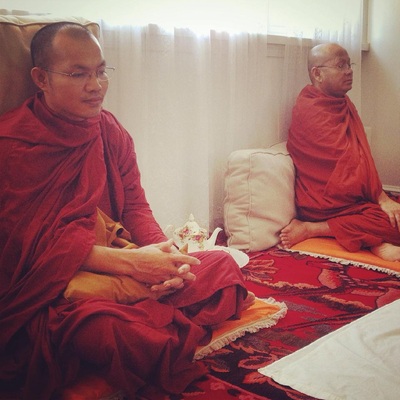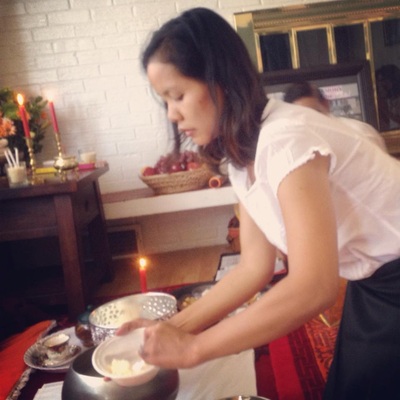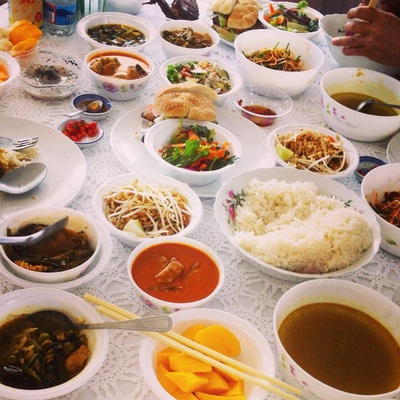| BANYAN BLOG |
banyan blog
|
Last week I had the strangest dream. I dreamt I was in the living room with my father. We were sitting on the floor and he had his shirt off but was wearing a sarong. I sat next to him and tightly wrapped my hands around his right arm, afraid to let go. He was sitting in a calm state and had a vacant but peaceful look on his face. I was hysterically crying, and kept saying to him “don’t go”, “don’t go”! Then my mother walked in the room and whispered to me “don’t tell him he is dead. He doesn’t know.” This wasn’t the first dream I had about my father, and I’m certain it won’t be the last.
A few months after he passed I had dreams about him while I was in Cambodia, but in those dreams I was never emotional. It was as if he was still here, in the way I didn’t want to remember him, suffering from the awful disease that ultimately took his life. In those dreams, his body was just a shell. He was elderly and handicapped and expressionless. In the dream, as in reality, I felt helpless. There was nothing I could do to make him better. But there was never any awareness that he was gone. He had been sick for so long that it was often difficult to remember how he was before the disease stole his health and robbed of his spirit. But this dream was different. His face and body was how I wanted to remember him, younger, healthier and seemingly at peace. One-Year Anniversary July 7th marks the one-year anniversary since my father’s passing. It is hard to believe that one-year has gone by already. Time seems to move forward and stand still all at once when you lose someone you love. In Buddhism, Cambodians believe that once a person has died, if you still dream about them, their spirit hasn’t moved on to the next life. I want him to move on his journey, but somehow I have a hard time of letting him go. This past weekend our family held a Buddhist ceremony to commemorate the one-year anniversary of his passing. In Khmer culture a Buddhist ceremony is held seven days, 100 days and one year after the death. It helps the living remember the deceased and help them gain merit to move onto the next life. Two monks from Silver Spring, Maryland came to the house to preside over the ceremony. They chanted, we provided them offerings and then there was a brief sermon from the younger monk. When the ceremony was over, I took the opportunity to ask the younger monk what the dream meant. Buddhism and Bonns With my limited understanding of Buddhism, I immediately thought this dream must have meant that he was finally in peace. The fact that he wasn’t wearing a shirt seemed like an insignificant detail to me, but it is quite significant one when dreaming about the deceased. The first thing the monk said was that I must buy him a ‘gee-bo’, a saffron robe that the monks wear, and conduct a ‘bonn’ in his name. Cambodians are deeply spiritual people. The majority of Cambodians are Buddhists and practice Theravada Buddhism, which is common in Southeast Asia. Whenever Cambodians are confronted with a problem, for example, if someone is very sick, they pray to Buddha by conducting a ‘bonn’ or a blessing ceremony. These ‘bonns' can be a simple ceremony whereby an individual buys a few items for the monks, such as food or toiletries, or the saffron robe. The monk blesses these items and through this act, it earns merit for the individual and the ancestors. Bonns can also be larger and elaborate ceremonies to bless a wedding, preside over a funeral, or bless a school with more elaborate offerings such as money for the pagoda, and/or food and money for the local community. It can also be simple acts of kindness to other people who are less fortunate. Simply put, ‘bonn’, means to ‘do good’. And by doing good, we gain merit. The more merit we accumulate, the better chance we—and our ancestors—will be reborn with less suffering. Bonns for the deceased is a way in which Cambodians earn merit for their loved ones by providing an offering to the monks. The monks serve as a conduit into the spiritual world. By providing offerings to the monks, the deceased earn merit from the living through these ‘bonns’. Phcum Bun is the largest religious holiday in Cambodia. It is a time when Cambodians flock to the pagodas and make offerings to their ancestors to help them earn merit for the next life. According to Theravada Buddhism, by offering a ‘gee-bo’ to the monk or even clothes for thoii9se who are considered holy, such as the achar (layman priests), my father will gain merit in his afterlife. He may be suffering now because he is cold. If I conduct a bonn for him and offer a gee-bo, he will have clothes to keep him warm in his afterlife. When asked whether reoccurring dreams meant that he hasn’t moved onto his next life, the monk had a more nuanced explanation. He said that it could mean he hasn’t found his place to move onto the next life. I can do more ‘bonns’ to help him find his place. But it was his last explanation that seemed to make the most sense to me. He said, it could simply mean that I miss him very much…
0 Comments
Leave a Reply. |
FEATURED INMOST POPULARThe Journey Archives
October 2022
follow |
© banyan blog 2013-2022
All Rights Reserved
All Rights Reserved





